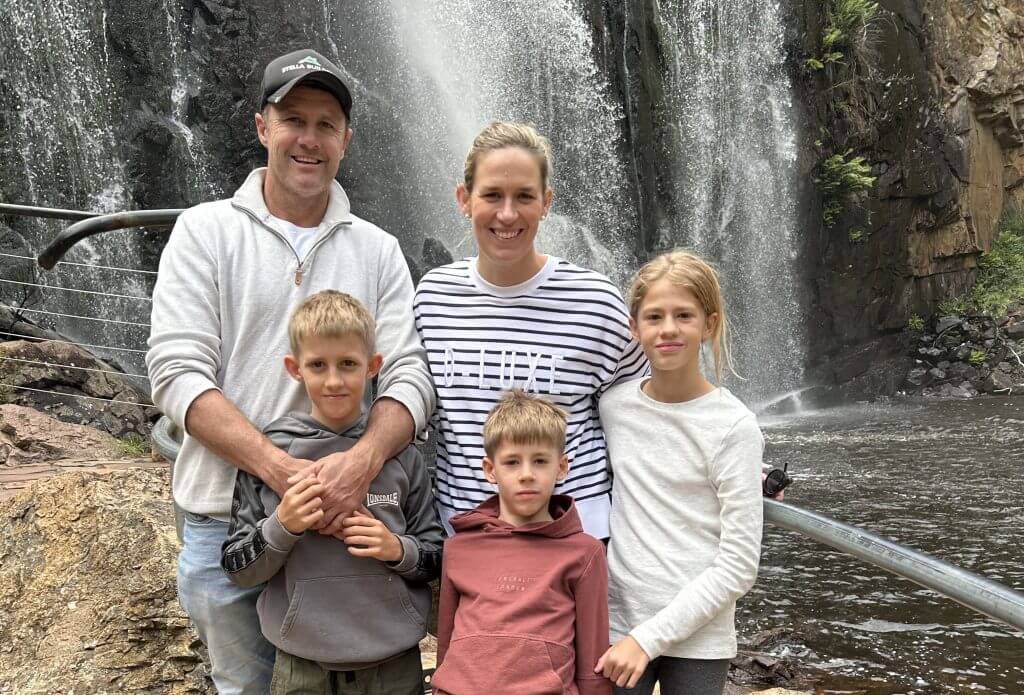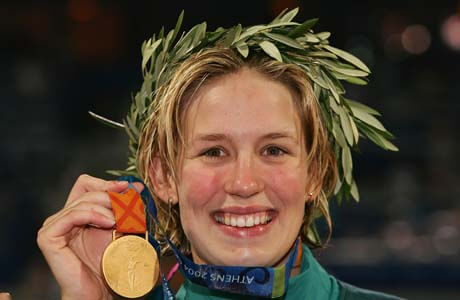Catching Up With … Aussie Olympic Champ Jodie Henry Making a Difference for New Generation

Catching Up With … Aussie Olympic Champ Jodie Henry Making a Difference for New Generation
After a record-breaking week in the pool back in 2004 at Athens, Australia’s Jodie Henry left the birthplace of the Modern Olympic Games as a triple Olympic gold medalist and triple world record holder, heralding the dawning of a new era in Australian women’s swimming.
It’s been 20 years since Jodie Henry emerged as a member of a revolutionary group of Australian sprint freestyling women who arrived into the 2004 Olympic city of Athens with golden dreams.
Henry, a humble, happy-go-lucky Queenslander, unleashed her back-end speed to win individual gold in the 100 meter freestyle final, beating former world record holder Inge de Bruijn (NED) and the celebrated Natalie Coughlin (USA). Henry’s title was complemented by a world record, as she broke teammate Libby Lenton’s mark with her 53.52 in the semifinal.
Henry also anchored the Australian women to not one, but two relay gold medals in the 400 freestyle and the 400 medley—both in world-record times.
MAKING A DIFFERENCE
Flash forward to 2024: When the current crop of Aussie world-beating sprinters—Emma McKeon, Mollie O’Callaghan, Shayna Jack, Meg Harris, Bronte Campbell and Olivia Wunsch—took to the pool deck in Paris for the latest Olympiad, Henry was left pacing the floor of her Brisbane home, chewing her fingernails!

Photo Courtesy: Adam Pretty
Henry, now 40 and the mother of three youngsters, has a vested interest in the current batch of Dolphins who have carried the Olympic 400 freestyle relay torch over the past two decades. After all, it was a flame lit by Henry and her team in those golden Games of Athens. The Class of 2024 added a record-equaling fourth consecutive 400 freestyle relay gold medal in Paris to their wins in London, Rio and Tokyo.
Along with fellow Olympian Linley Frame, Henry works with Australia’s Olympians and Paralympians in Athlete Wellbeing for Swimming Australia. She is tasked with making a difference in the lives of the current-day swimmers and setting them up for life after sport.
Henry is passionate about her role: “Knowing them adds those extra nerves on top and especially when you know some are quite nervous racers as well,” said Henry. “You just want them to do their best…to touch that wall and be happy with how they went.
“We work with our national-team athletes in both our Olympic and Paralympic programs, so we have between 70 and 80 athletes that we look after. It’s a program that entails engaging with each athlete—which can be very different, too…depending on the athlete. It is so good to see these athletes with a future focus and a future-thinking mindset, knowing that swimming isn’t going to last forever. They are working toward that next professional goal after swimming…which is really good to see.
“In our generation, swimmers often struggled with that transition out of sport because they did not really have that identity beyond being the athlete. So, it’s really good to see now that people are more aware of that, and we know that transition out of sport is going to be hard no matter what. When you go from being an athlete to becoming a normal person in the community—and the challenges that always come with that—it is really nice to see that it’s changing.”
A BIT OF HISTORY
Henry became only the third Australian woman to win the coveted individual 100 freestyle Olympic title. The 2004 team was only the second Australian squad to win the 400 freestyle relay and the first team to win the 400 medley relay.
The 100 freestyle was first swum for women in Stockholm in 1912, when Australian Hall of Famer Fanny Durack won her Olympic gold ahead of fellow Aussie Mina Wylie in a history-making beginning for women’s swimming.
It wasn’t until 44 years later that the unstoppable Dawn Fraser won the first of her three 100 freestyle crowns in Melbourne in 1956, followed by Rome in 1960 and Tokyo in 1964.
After Fraser’s history-making feats, no Australian had stepped up to the Olympic medal dais in the 100 freestyle for 32 years—since Munich in 1972 when Shane Gould won bronze behind the U.S. pair of Sandra Neilson and Shirley Babashoff.
About a half-century removed from the Fraser era, Australian coaches capitalized on their talented group of emerging freestylers, led by Henry, Lenton, Alice Mills and established two-time Olympians Sarah Ryan and Olympic butterfly medalist Petria Thomas, bringing them together for specially organized training camps.
“We were the start of that sprint revolution—back in the day when training was always just piling up kilometer after kilometer,” Henry said. “But in the early 2000s, we had coaches who realized that’s probably not the best way to coach female sprinters.
“So we were able to turn it on its head, and we put some really good sessions together and were able to build and build…and eventually, we were able to unleash our speed. It started with myself and Alice (Mills), and then Libby (Lenton) came on the scene. Alice and I trained together (under Coach Shannon Rollason), so we knew what each other was doing a lot of the time in training…and (we pushed) each other along and knew what was possible as well.
“Libby wasn’t with us every day (since she trained in another program with Coach Stefan Widmer), but it was so good when we all came together, feeding off each other. It was a time when Inge de Bruijn was breaking 54 seconds for 100 freestyle. And it was like, ‘OMG—that’s just a freak of nature…that’s not possible!’”
But by the time the Australians arrived in Athens after their German training camp, they knew anything was possible.
A NEW CHAPTER OF OLYMPIC GLORY
At the 2004 Olympics, the Aussie women wasted no time in making their mark and turning heads on the pool deck with the 400 freestyle relay on the opening night of the jam-packed eight-day program. Olympic glory and their own chapter in Australia’s storied swimming history awaited.
In 1912, Durack and Wylie had finished first and second in the individual 100 freestyle. Since they were the only two females on the team, Australia put it to Olympic officials that they swim two legs each. That proposal was rejected.
In 1956, it was Fraser who led her team to win Australia’s first gold in the women’s 400 free relay, with Lorraine Crapp, Sandra Morgan and Faith Leech.
In 2004, the Australians had the luxury of leading off with Mills, followed by then world record holder Lenton—who had broken de Bruijn’s world mark at the Australian Trials (with the time lowered later in the week by Henry in the semifinal)—followed by Thomas.
Henry powered past U.S. legend and another former world record holder in Jenny Thompson on the anchor leg, clocking the fastest time in history with her split of 52.95.
The Australians broke the U.S. stranglehold on an event they had owned since Barcelona in 1992, and they took down East Germany’s world record.
STAYING FOCUSED
Henry knew the pressure was now off…or was it?
“The fact that we won the 4×100 free on the first night sort of lifted the pressure a bit, but then on the flip side, it didn’t after I swam that pretty good anchor leg,” recalled Henry. “It was the start of a fantastic week for me, one that felt like an out-of-body experience—like you were watching someone else do it.
“So, for me, the proudest thing about winning the 100 was that I was able to stay focused…to keep my mind and body on the job—doing what was supposed to be done, which was swimming two laps of freestyle up and down the pool as fast as I could. As simple as it sounds, your head can really get in the way of that, so that’s the thing I’m most proud of—that I didn’t let my head get in the way.”
* * *
Married to Brisbane Lions former Australian Rules Football Premiership winner Tim Notting, the couple has three kids: Emmy (14), Charlie (12) and Freddie (9). When Swimming World tracked her down, Henry was on the Queensland Sunshine Coast doing what she does in her role, catching up with the next generation preparing for LA28 and Brisbane 2032.
Says Henry: “Sometimes you just get to a point where you want to give back, and I’m fortunate enough to be playing this role now.”




Never short of a rew words … great read ian